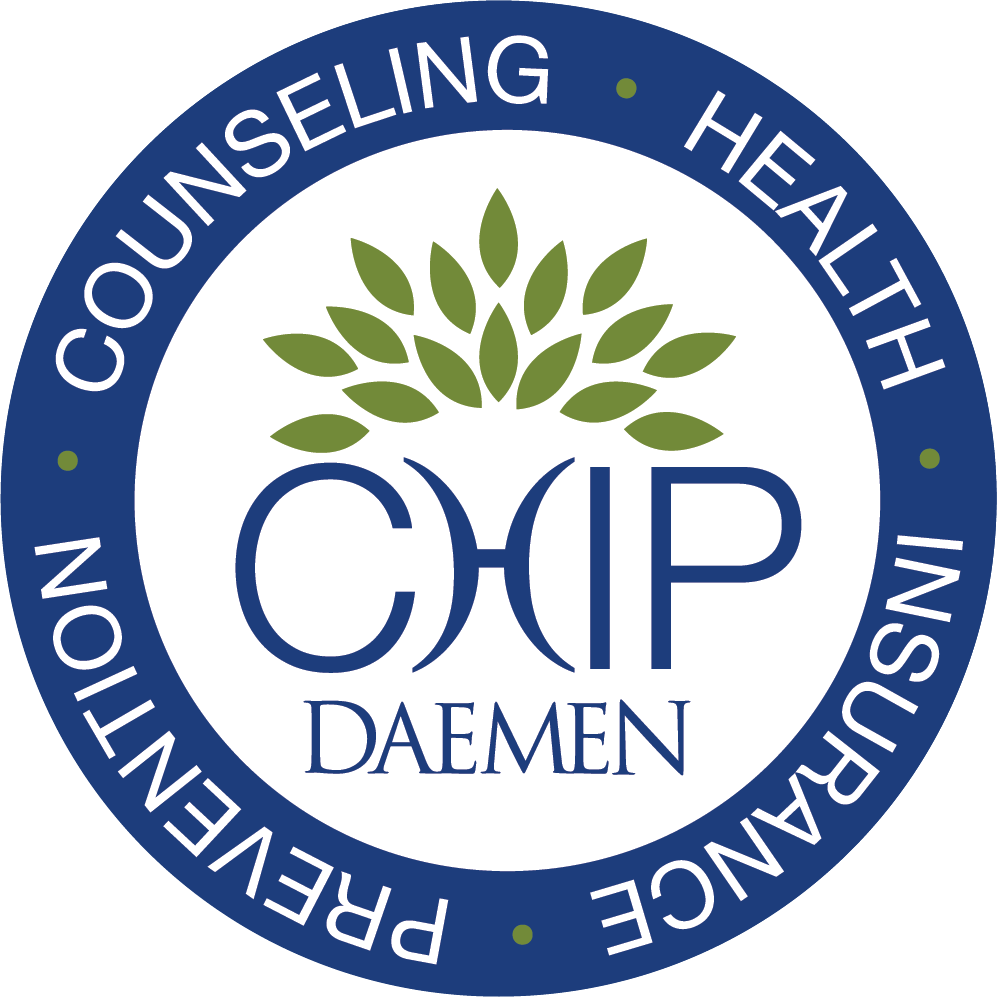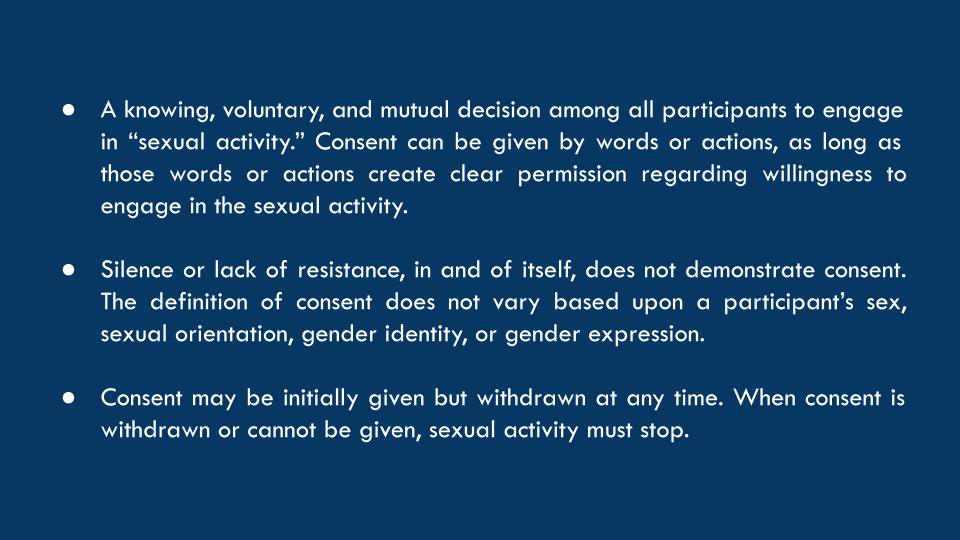Community Standards & Student Advocacy
The department of Community Standards & Student Advocacy is determined to advocate for all students by assisting them in setting and achieving their academic, professional, and personal goals, through creating an environment that ensures all students feel safe, respected, and valued with adherence of Daemen University’s policies, procedures, and Code of Conduct.
One of our goals in advocacy is to enlighten students in any way, shape, or form. We want every student to have a remarkable academic career coupled with wonderful experiences outside of the classroom with minimal limitations. We implement a model of education-centric restorative justice within our community standards and conduct process that is equitable to all students.
This site should be able to help students navigate answers regarding stress, crisis, how to report, Student’s Bill of Rights, Title IX, Clery Act, the Reach Out app, and a myriad of relatable topics.
We want to provide additional information on On & Off Campus resources that may help all Daemen community members make informed, healthy, and responsible decisions.
In addition, we offer a chance for students to play a role in helping Daemen facilitate the optimal college experience. Students will be able to submit requests, opinions, concerns, suggestions, or give a shoutout to a staff member through our Student Virtual Suggestion Box. Each submission will be taken into careful consideration by our team. Students also have the option of reaching out to our team directly for more information.
Regardless of the services sought, the office and staff remain respectful of the privacy of each and every student. Additionally, staff will remain in compliance with Daemen's policies & practices. Visit the Registrar for more information on student, parent and faculty/staff rights.
Miguel Rodriguez, M.S.
Director of Community Standards & Student Advocacy
*** Photos are links to respective resource's website ***
 |
Campus Safety716-839-SAFE (7233) |
 |
Care Report |
 |
Bias Report&Chosen Name Policy |
Dr. Kerry L. SpicerVice President for Student Affairs |
|
%20(1).png) |
Luke Haumesser Dean of Students |
_0.jpg) |
Miguel RodriguezDirector of Community Standards & Student Advocacy |
 |
CHIP Center |
 |
Residence Life |
 |
Crisis Services(716) 834-3131 {available 24 hours} |
Student Success Center (SSC) |
Academic Advisement |
Student Code of Conduct
In addition to the policies listed in various sections of this handbook, the Daemen University Student Code of Conduct outlines behaviors that are prohibited at the University. The specific items are not meant to serve as an exhaustive list, but as a general guideline for addressing student behavior. The University reserves the right to address other behaviors that occur that are considered detrimental to the learning environment and/or health and safety of the University community.
To that end, prohibited behavior at Daemen University includes the following:
- Non-academic dishonesty, including, but not limited to, theft, attempted theft, possession of stolen property, forgery, and falsification of information provided to any University official;
- Lying: any statement, action, or behavior with the intent to deceive
- Possession and/or use of any fradulent documentation
- Stealing: knowingly taking an item or items without the owner’s expressed permission
- Eluding or evading: any statement, action, or behavior with the intent of hiding the truth, including running or hiding from University personnel
- Aiding and abetting: knowingly encouraging, assisting and or being an accessory to any act prohibited by the Student Code of Conduct
- Conduct which threatens the physical or psychological health and/or safety of any person (including the person committing the act) or the sanctity of the campus, including, but not limited to physical or sexual assault. (See also the policies on Sexual Violence and Assault and Prohibiting Unlawful Harassment including Sexual Harassment in Section 5 of this Handbook);
- Dating Violence: violence, whether physical, sexual, or the threat thereof, committed by a person who is or has been in a social relationship of a romantic or intimate nature with the victim.
- Domestic Violence: a felony or misdemeanor crime of violence committed by a current or former spouse or intimate partner, a cohabiting partner, or another person with whom the victim shares a child.
- Sexual Harassment: as defined in Section 5 of this Handbook.
- Sexual Assault/Rape: an offense that meets the definition of rape, sodomy, sexual assault with an object, criminal sexual contact, incest, or statutory rape as used in the FBI’s UCR program.
- Stalking: any act, whether via phone, internet, or physical proximity, that, through unwanted and/or unsolicited viewing or communicating, threatens an individual’s physical or emotional safety.
- Physical Attack.
- Hazing.
- Harassment: any act, whether written or verbal, via online or in person, that abuses, intimidates, or threatens the safety of a member of the Daemen University community.
- Failure to maintain personal health, whether physical, mental or emotional, in such a way that it threatens the safety and security of the individual or the University community.
- Use or possession of firearms, fireworks, or other weapons that could be considered lethal, including those weapons for which the person has a permit.
- Damage to, or misuse of, public, private, personal or University property;
- Property Damage, either to an individual’s or the University’s property.
- Removing approved postings and/or Office of Housing & Residence Life notices or bulletin boards.
- Littering, applying graffiti, and/or other behavior which threaten the cleanliness and appearance of the University.
- Use of or tampering with fire equipment, including, but not limited to, smoke detectors, sprinklers, extinguishers, and/or hoses, in any manner or which it was not intended.
- Defenestration: throwing objects outside of the window or from a balcony or roof.
- Violation of policies as described in the Student Handbook, the University Catalog, the Housing Agreement and all other rules governing University facilities, programs, and services including, but not limited to the following;
- Violation of Housing & Residence Life policies (see Residential Living policies section).
- Purchase, possession, use, consumption, sale or distribution of alcohol, except by consumers of legal age and in compliance with the University’s alcohol policy.
- Possession or use of alcohol paraphernalia and/or items or activities that may promote binge, heavy, or episodic drinking, such as, but not limited to, kegs and beer pong balls.
- Distribution or attempted distribution of alcohol to any person under the legal drinking age.
- Distribution or attempted distribution of a drug, including prescription medication.
- Illegal use or possession of a drug, including prescription and over-the-counter drugs.
- Manufacturing of any drug, including growing marijuana for any purpose.
- Possession or use of illegal or someone else’s drugs and/or drug paraphernalia.
- Accessing prohibited areas in the residence halls, including but not limited to fire escapes, balconies, and basements, except in an emergency.
- Misuse and/or removal of residence hall property
- Intentional obstruction or disruption of teaching, research, administration, disciplinary procedure, or other University activities or activities authorized to take place on University property;
- Disorderly conduct including acts which breach the peace;
- Any verbal or physical behavior which denigrates or shows hostility towards any Daemen Community member
- Any behavior which disrupts or breaches the peace of any class, event, standard practices, etc.
- Unauthorized or improper entry, whether peacefully or by force, into a prohibited area or residence hall, apartment, and.or suite in which there is no documented reason for being present
- Urinating in public
- Non-compliance with the directions of University or civil authorities performing official duties, including, but not limited to;
- Failure to give proper identification when requested.
- Multiple violations of the University’s Parking and/or Transportation policies
- Violation of another student’s rights or privileges and verbal or written harassment, discrimination, abuse and/or disrespect of any person;
- Harassment: any act, whether written or verbal, via online or in person, that abuses, intimidates, or threatens the safety of a member of the Daemen University community.
- Acts or abusive language, either in public or via online sources.
- Conduct which is disrespectful to the community and diversity within, including, but not limited to;
- Any behavior which creates a hazardous, unhealthy, or unsanitary condition;
- Multiple violations of the University’s Good Neighbor Policy
- Violation of statutes, laws, ordinances and/or regulations of the Town of Amherst, State of New York (or other states, when applicable), and the United States of America.
*More information on the student code of conduct and the conduct process can be found in Section 8 of the Student Handbook*
Student Handbook
We are committed to reducing barriers for students to report sexual assault and violence. To that end, we have partnered with Capptivation to launch the Reach Out Editions App, an anonymous smartphone resource guide. The Reach Out Editions App is available for download in the Apple and Google Play Stores.
Students, faculty, staff and supporters are encouraged to review the Reach Out App Overview and Campus Sexual Assault Victims' Bill of Rights & FAQs.
-
Student Version: With this comprehensive resource at their fingertips, students can gain information and resources for navigating the reporting process, seek support and connect with resources both on campus and in the community.
-
Responsible Employees: In accordance with the Clery Act and Title IX, the Reach Out Editions App offers a Responsible Employees version for staff to be informed and report instances of sexual misconduct.
.png)
.pptx.png)
Definitions
Affirmative Consent

.jpg)
Daemen University's Amnesty Policy
.jpg)
Links
Title IX (Sexual Harassment / Sex Discrimination)
Family Educational Rights & Privacy Act (FERPA)
Violence Against Women Act (VAWA)
Health Insurance Portability and Accountability Act (HIPPA)
Daemen University students can access legal advice through the Campus Legal Advocate Clinic to meet with Young Woo Kim, an associate with Rupp Baase Pfalzgraf Cunningham LLC. Kim can provide students with initial assistance, guidance, and resources related to legal issues or concerns.
For more information or questions, please contact Miguel Rodriguez, Director for Community Standards and Student Advocacy, by calling 716-839-8200 or via email at mrodrig1@daemen.edu.

.png)